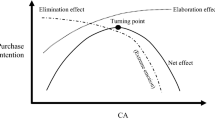Abstract
Most studies of consumer animosity employed only explicit self-report measures on consumers’ responses and did not systematically compare the effects across product categories. To fill this gap, the current study investigated the impacts of economic animosity not only on consumers’ explicit but implicit attitudes and compared the influences between product categories of different typicality levels.
Access provided by CONRICYT-eBooks. Download conference paper PDF
Similar content being viewed by others
The study was conducted in Taiwan. South Korea was selected as the economically hostile country of Taiwanese participants due to its economic competition status with Taiwan in the global market. Smartphone (durable product) and kimchi (non-durable product) were selected as the typical products; bicycle (durable product) and beer (non-durable product) were selected as the atypical products. In total, 204 local students participated this study and were required to evaluate their explicit and implicit attitude toward the product assigned to them.
The result shows that typical products from economically hostile countries may enjoy more positive consumers’ implicit attitudes than atypical products from the same country. However, consumers do not show such enhancement effects overtly in their explicit attitudes. Social desirability may play an important role in such results since people prefer to perform their attitudes or behavior in conformity with social norms in front of other members in the society.
The results help academics to resolve the issue that some products from economically hostile countries gain, not loss instead, great market share in certain areas. According to the results of this research, typical products from economically hostile countries can attract positive consumer implicit attitudes and may result in more purchase of the products, which may increase the market share of the products.
Author information
Authors and Affiliations
Corresponding author
Editor information
Editors and Affiliations
Rights and permissions
Copyright information
© 2018 Springer International Publishing AG
About this paper
Cite this paper
Tseng, TH., Balabanis, G., Liu, M. (2018). Can Product Typicality Enhance Consumers’ Attitudes Toward Goods from Economically Hostile Countries? An Abstract. In: Rossi, P., Krey, N. (eds) Marketing Transformation: Marketing Practice in an Ever Changing World. AMSWMC 2017. Developments in Marketing Science: Proceedings of the Academy of Marketing Science. Springer, Cham. https://doi.org/10.1007/978-3-319-68750-6_7
Download citation
DOI: https://doi.org/10.1007/978-3-319-68750-6_7
Published:
Publisher Name: Springer, Cham
Print ISBN: 978-3-319-68749-0
Online ISBN: 978-3-319-68750-6
eBook Packages: Business and ManagementBusiness and Management (R0)




